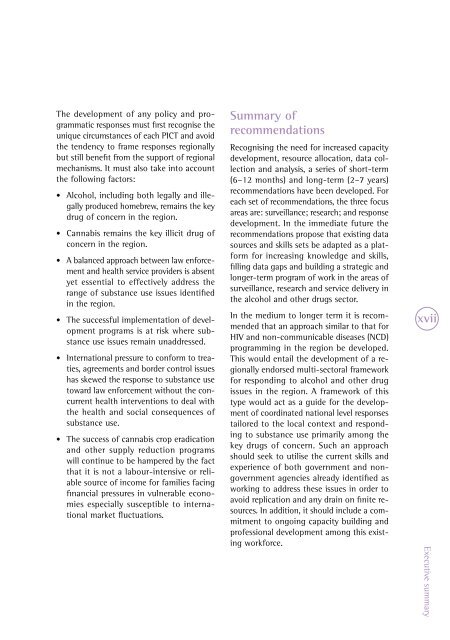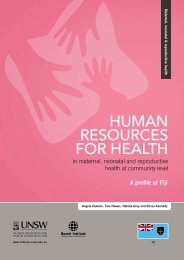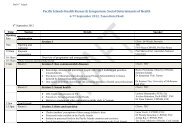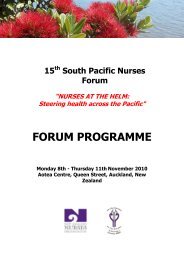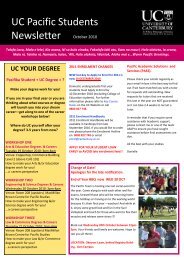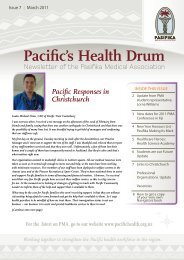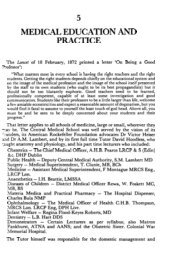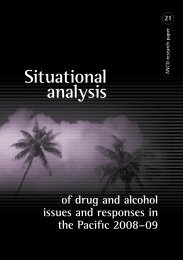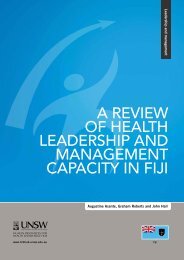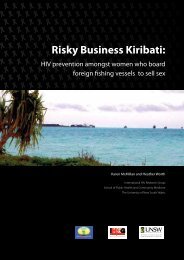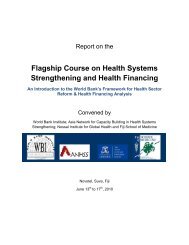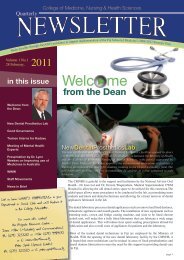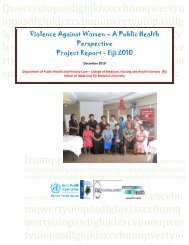rp21 situational analysis - Pacific Health Voices
rp21 situational analysis - Pacific Health Voices
rp21 situational analysis - Pacific Health Voices
You also want an ePaper? Increase the reach of your titles
YUMPU automatically turns print PDFs into web optimized ePapers that Google loves.
The development of any policy and programmatic<br />
responses must first recognise the<br />
unique circumstances of each PICT and avoid<br />
the tendency to frame responses regionally<br />
but still benefit from the support of regional<br />
mechanisms. It must also take into account<br />
the following factors:<br />
• Alcohol, including both legally and illegally<br />
produced homebrew, remains the key<br />
drug of concern in the region.<br />
• Cannabis remains the key illicit drug of<br />
concern in the region.<br />
• A balanced approach between law enforcement<br />
and health service providers is absent<br />
yet essential to effectively address the<br />
range of substance use issues identified<br />
in the region.<br />
• The successful implementation of development<br />
programs is at risk where substance<br />
use issues remain unaddressed.<br />
• International pressure to conform to treaties,<br />
agreements and border control issues<br />
has skewed the response to substance use<br />
toward law enforcement without the concurrent<br />
health interventions to deal with<br />
the health and social consequences of<br />
substance use.<br />
• The success of cannabis crop eradication<br />
and other supply reduction programs<br />
will continue to be hampered by the fact<br />
that it is not a labour-intensive or reliable<br />
source of income for families facing<br />
financial pressures in vulnerable economies<br />
especially susceptible to international<br />
market fluctuations.<br />
Summary of<br />
recommendations<br />
Recognising the need for increased capacity<br />
development, resource allocation, data collection<br />
and <strong>analysis</strong>, a series of short-term<br />
(6–12 months) and long-term (2–7 years)<br />
recommendations have been developed. For<br />
each set of recommendations, the three focus<br />
areas are: surveillance; research; and response<br />
development. In the immediate future the<br />
recommendations propose that existing data<br />
sources and skills sets be adapted as a platform<br />
for increasing knowledge and skills,<br />
filling data gaps and building a strategic and<br />
longer-term program of work in the areas of<br />
surveillance, research and service delivery in<br />
the alcohol and other drugs sector.<br />
In the medium to longer term it is recommended<br />
that an approach similar to that for<br />
HIV and non-communicable diseases (NCD)<br />
programming in the region be developed.<br />
This would entail the development of a regionally<br />
endorsed multi-sectoral framework<br />
for responding to alcohol and other drug<br />
issues in the region. A framework of this<br />
type would act as a guide for the development<br />
of coordinated national level responses<br />
tailored to the local context and responding<br />
to substance use primarily among the<br />
key drugs of concern. Such an approach<br />
should seek to utilise the current skills and<br />
experience of both government and nongovernment<br />
agencies already identified as<br />
working to address these issues in order to<br />
avoid replication and any drain on finite resources.<br />
In addition, it should include a commitment<br />
to ongoing capacity building and<br />
professional development among this existing<br />
workforce.<br />
xvii<br />
Executive summary


